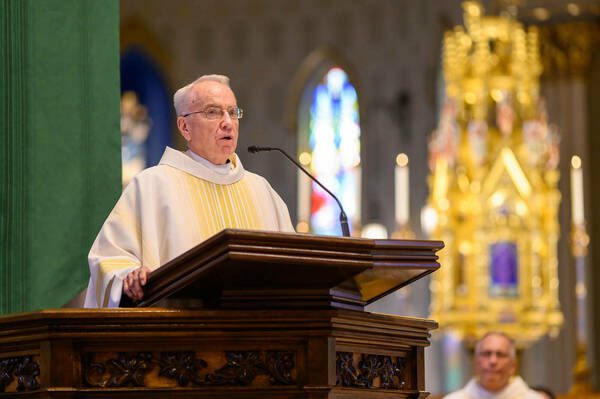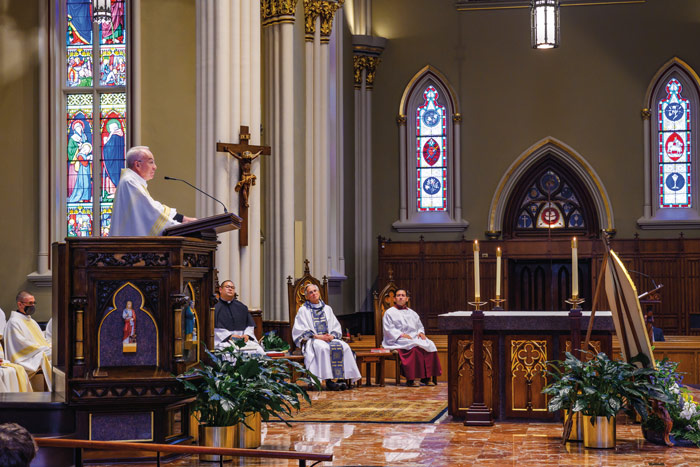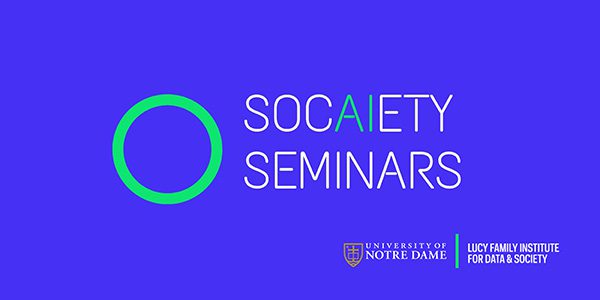Mendoza College of Business Centennial Mass

Mendoza College of Business commemorated its 100th anniversary with a special Centennial Mass on September 30, 2021, in the Basilica of the Sacred Heart. Many of the planned centennial festivities had been put on hold as the pandemic still dictated certain cautions around large gatherings. Despite the circumstances, the Mass — presided over by Father John Jenkins, C.S.C. and attended by hundreds of Mendoza and University faculty, staff, students, alumni and visitors — became an occasion to honor the past while forming a renewed College vision founded on a singular charge: to serve humankind.
Central to the Mass was the homily delivered by Father Oliver Williams, C.S.C., director of the Center for Ethics and Religious Values in Business, as he reflected on the young priest, John Cardinal O’Hara, C.S.C., who early in his life formed the unique charge for the business school at Notre Dame, and whose perseverance made it into a reality.
Fr. Williams’ homily begins at the 26:46 minute mark.
The Kingdom at Hand
Father Oliver William’s Homily for the Mendoza Centennial Mass
The kingdom of God is at hand. This was the overarching view of John Francis O’Hara. He was a religious man, a very bright man. But he understood “the kingdom of God is at hand” to mean that he, in his own little way, had to make the world a better place. He tried to bring the values of justice, and love and compassion into the world.
It might be helpful to look at a little background about John Francis O’Hara. As you may know, he later became a bishop after he left Notre Dame, and then a cardinal of Philadelphia. His body is just behind this altar in one of the alcoves, for those of you who may want to visit — a beautiful little shrine.

On April 20, 1921, the University established the Business College and called it the College of Foreign and Domestic Commerce and named its first dean, a 33-year-old Holy Cross priest, John Francis O’Hara. Notre Dame has been blessed with extremely talented leaders and John O’Hara was one of the best.
One of eight children and born in Michigan, his father served as the counsel general in Uruguay and Brazil for three years, moving the family to the new continent. John as a teenager applied himself in his new world and learned Latin American history as well as the Spanish language.
After returning to the United States, John applied to Notre Dame. His father did not have enough money to pay tuition, so the then-president Father Cavanaugh said, “If you teach Spanish to high school students, we’ll give you free tuition.” And that’s what he did. He studied economics and history at Notre Dame. Then at age 24, he applied and entered the congregation of Holy Cross and was ordained four years later.
John O’Hara was a devoutly religious person as well as an entrepreneur. He developed his ethical vision of corporate power from his religious conviction. The readings for the day give an overview of his perspective. The overarching worldview of O’Hara is expressed in today’s gospel (Luke 10:1-12), for it tells us that the kingdom of God is at hand, and what that means for us. Each of us are called in our own way to make the world a little better place for us having been there, bringing God’s love, justice and compassion to our world.
O’Hara understood the great challenge of living the gospel in his time. Today’s second reading (James 2:14-18) states the challenge well. The reading from the letter of James says, “If a brother or sister has nothing to wear and no food for the day, and one of you says to them, ‘Go in peace, keep warm and eat well,’ but what good is that?” And of course the point that James is making is that faith is not just a noun, it’s a verb. If we have faith we’re implied to action, to try in our own small way, to make the world a better place for us having been there.
A little known fact is that John O’Hara studied at the Wharton Business School of the University of Pennsylvania. He understood the great power that business could have. And he was persistent in asking to start a business school at Notre Dame. As you might imagine, it wasn’t always received so well. So our current dean, when he sees controversy, should know this has been going on 100 years.
O’Hara saw that business could be a great force for good. He wanted to Grow the Good in Business, as we say today, to advance the kingdom of God — creating jobs, enhancing wealth and giving people the possibility of having a good life. He understood that faith without works is dead. Faith is not simply a noun, it’s a verb that entails actions to deliver the vision of the kingdom of God.
O’Hara had a good sense of humor, I might add. And he had no fear of controversy. He often quoted St. Paul. St. Paul had the famous expression, “Whether you eat or drink, or whatsoever else you do, do all for the glory of God.” And John Cardinal O’Hara commented, “The ‘whatever else you do’ includes football.” This comment was not a little controversial in his time 100 years ago. But that was what he was known for.
On a serious note, his quote was the overarching theme of his work in the business school and the guiding vision of the school even today. That is, we’re trying to educate the whole person: the mind, the body and the spirit.
O’Hara was not afraid of controversy. In fact, the year after he took over as dean, a 1923 Dome — the Dome is the yearbook of Notre Dame — mirrored many of the sentiments of the time. The Dome wrote: “Universities are becoming man factories, mere means for training men to make money. The business courses are popular, the liberal arts courses are neglected. Our measure of success is money making.”
John Cardinal O’Hara, just a priest at that time, answered quickly. He said, “The primary function of commerce is to serve humankind. Business has a code of ethics based very largely on divine principles. And when the code is followed, commerce can and does
advance civilization. The College of Commerce has a real function. It should send people into business with a sound knowledge of business theory, with the sort of character that should grace a gentleman of the world, with lofty ideals of citizenship, and a sound conception of business morality based on the seventh commandment and the eight Beatitudes. And this person should have a character that will put those principles into practice under whatever temptations the world might offer.”
O’Hara had great plans for the business school, but repeatedly ran into problems with underfunding. Many would argue that this has been a problem for 100 years! Perhaps we should ask the current dean. Many of his great ideals took almost 100 years to put into practice and some are a work in progress. Slowly, deans in the last 100 years have worked toward the great vision of O’Hara. But of course, there is much more to do.
We have been blessed with remarkable leadership in the Mendoza College of Business. And while I certainly can’t discuss all the excellent deans we have had, I would like to call your attention to three. As Father John Jenkins, our president, mentioned in opening our liturgy, we offer our Mass today for Frank Reilly, who was the dean from 1981-1987. Frank died on September 23, 2021. He was hoping to be here. Frank was a good friend of mine, and we had dinner just a couple weeks ago.
I remember how he was appointed. Father Ted Hesburg, C.S.C., and Provost Tim O’Meara searched for a dean who would bring a vigorous research focus to the College to match its outstanding reputation for teaching and attention to students. Frank was that dean and he did much to bring the College to the next level of research. And we are all most grateful to him.
Another outstanding dean is Carolyn Woo, who served from 1997-2012, and enhanced the research reputation as well as a renewed emphasis on the ethics of business. Under her leadership, required courses were instituted for business ethics, for both the undergraduate and the graduate programs.
Today, we are blessed to have Martijn Cremers as dean, a major scholar in finance who strives to integrate his discipline with the challenges of Catholic social teaching and corporate social responsibility. No small challenge, I might add.
We have come a long way in developing the ethical vision of corporate power that was put forward so well by John O’Hara and we have a long way to go. As we advance and develop the Mendoza College of Business in the years ahead, we might well find inspiration and insight from the episcopal motto that O’Hara selected as a bishop and a cardinal: “Follow the Blessed Virgin Mary, and you will not go astray.”
Rev. Oliver Williams, C.S.C. is an associate professor of Management & Organization and the director of the Notre Dame Center for Ethics and Religious Values in Business. A former naval officer, Williams earned his doctorate from Vanderbilt University and his bachelor’s and master’s degrees from Notre Dame. He is a Catholic priest in the Congregation of Holy Cross.
This homily was reprinted from the Spring 2022 issue of Mendoza Business, the biannual alumni magazine of the Mendoza College of Business. Dedicated to telling the story of Mendoza, the magazine provides a comprehensive view of current College news, as well as larger thought leadership in business and business education.
September 30, 2021


